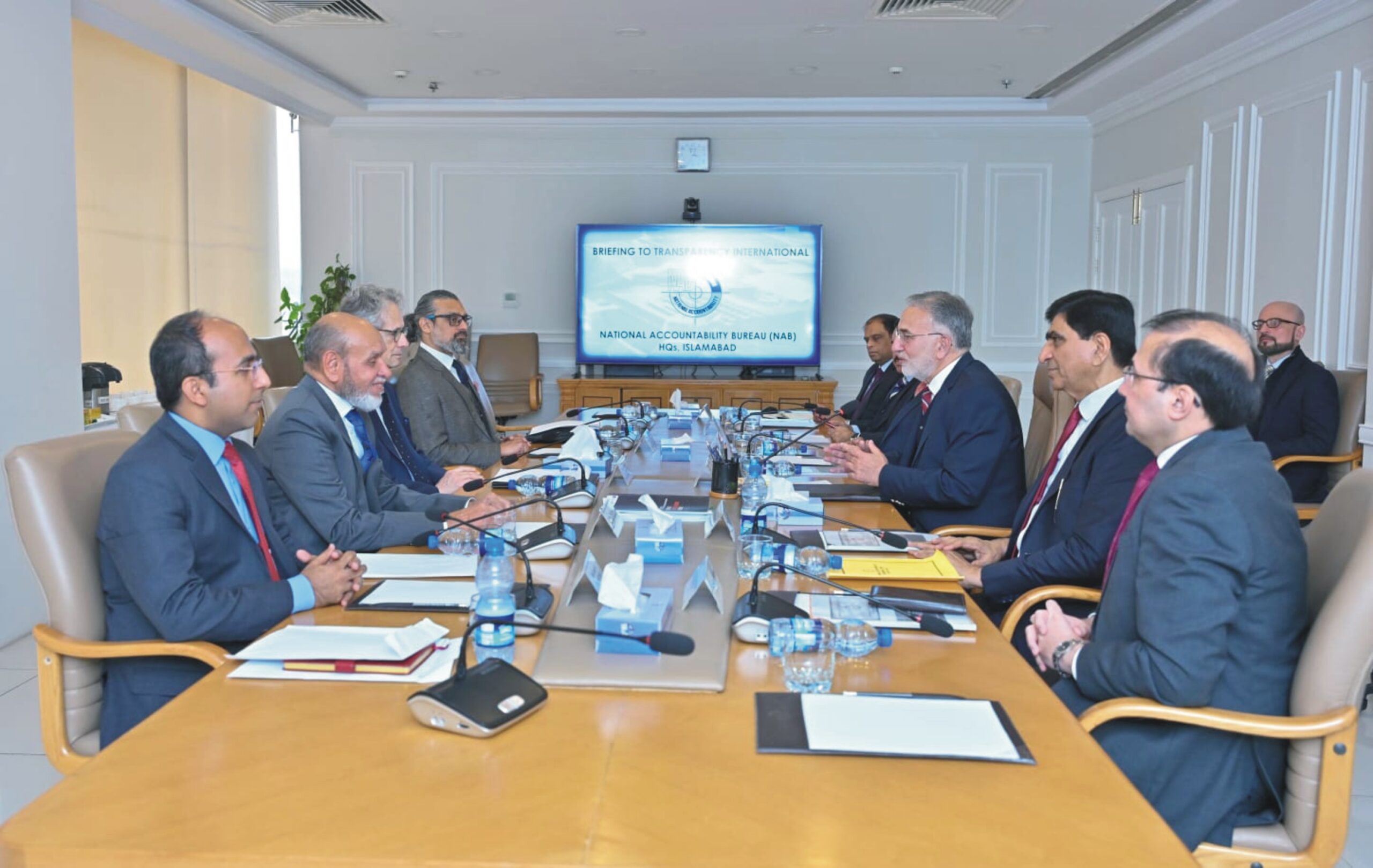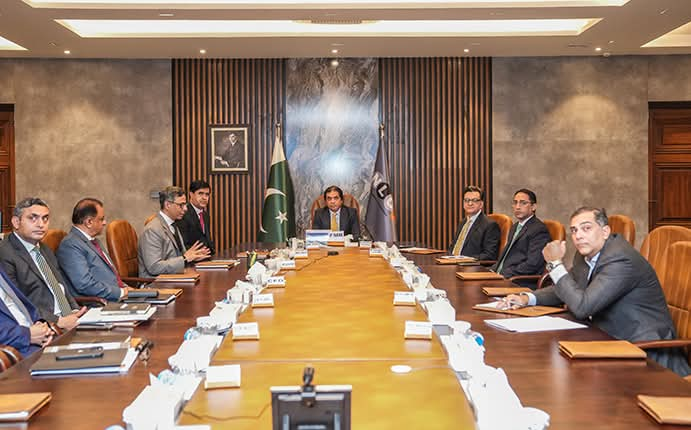Spokesman Report
Karachi : The United Nations and Federation of Pakistan Chambers of Commerce & Industry (FPCCI) organized ‘UN and Private Sector Consultation: Exploring Potential for Sustained Collaboration’ at a local hotel in Karachi. The Head of the UN Resident Coordinator’s Officer (UNRCO), Shah Nasir Khan, the Senior Vice President FPCCI, Muhammad Suleman Chawla, VP Engineer, M.A. Jabbar, Dr. Jawaid Qureshi, and Dr. Farhan Ahmed, the Convener and Deputy Convener of the UN Committee of FPCCI participated in it. The UN officials from UNRCO, UNIDO (UN Industrial Development Organization), UNDP (UN Development Program), UNICEF (UN Children’s Fund), UN Women, FAO (Food and Agricultural Organization), WFP (World Food Programme), and UN Global Compact Network from Pakistan, and Bangladesh orientated the participants on the UN Sustainable Development Cooperation Framework (UNSDCF) for Pakistan for 2023-2027, importance of engagement with the private sector, financing for sustaining development and business and human rights. Officials from public and private sector, academia, NGOs and civil society, women, representatives of youth, and the Turkish Consul General, Cemal Sangu participated in the event.
Keeping in view the sustainable development goals (SDGs), the UN in Pakistan has set five priorities (outcomes) for Pakistan for the next 5 years that include basic social services (health, nutrition, WASH, education, social protection) , gender and women empowerment, climate change and environment, sustainable inclusive economic growth and decent work, and governance (rule of law, ethics, transparency, and accountability for the public and private sectors). The participants of the event provided their valuable input to the UN for consideration of their framework. The draft framework now is being reviewed by the government of Pakistan before its final approval.
Mr. Barkaat Ali (Development Coordination Officer-UNRCO) while highlighting the seriousness of engagement with the private sector shared that globally US$ 5-7 trillion were required per year to achieve SDGs and the annual gap was US$ 2.5 trillion. Similarly, Pakistan, according to one estimate, required US$ 31 billion per annum between 2019 and 2030 to achieve its targets. The collaboration between the Government, the private sector and the UN was thus critical. Mr. Shah Nasir Khan informed that UNSDCF would require US$ 4.7 billion for its implementation out of which US$ 1.16 billion (24%) were available. These funds are deployed for development of various sectors under different programs and initiatives including trade, industry, entrepreneurial development, gender equality, women empowerment, youth development, etc. The audience were briefed on various projects of the UN in Pakistan. The UN Secretary-General, António Guterres recently visited Pakistan and sought help from the international community for Pakistan to respond to the unprecedented floods which have cost an estimated loss of US$ 30 billion to the country.
The SVP FPCCI, Muhammad Suleman Chawla, highly appreciated the efforts of the UN agencies and their financial and technical assistance in various sectors. He lauded the efforts of the Central Standing Committee of UN Affairs of FPCCI and its Convener, Dr. Jawaid Qureshi, for holding such productive events. He informed that FPCCI has various standing committees like health, education, environment, women entrepreneurship and women empowerment, etc., which contribute to social and economic development, including the SDGs.
In the panel discussion, the VP Engineer, M.A. Jabbar, stated that the governance system in Pakistan is very weak. There is a lack of transparency, accountability, participation of all the stakeholders, collaboration, and cooperation. There is a trust deficit between the public and private sectors. However, there is a serious need to overcome these gaps. He cited various examples of hazardous effects of industrial waste, pollution, noise pollution, and ignorance by most of the industrialists and private sector. However, there are companies that have high concerns and measures to protect the natural environment He advised that the Government of Sindh and the Federal Government should reconsider their agreement on setting up a railway infrastructure to dispatch coal of Thar to the industrial zones of Punjab, etc. for energy production. Rather, they should establish a coal-fired plant in Thar and put the energy into the national grid.
The UN representatives also highlighted various serious issues concerning climate change, global warming, and challenges to the biodiversity and ecosystem caused by environmental degradation and its cost to the society and economy. The developed countries caused the highest degradation to the environment, but now they are considering impactful measures for carbon neutral or net zero effect. The Indus Basin system of rivers is creating livelihood for millions of people in Pakistan and neighbouring countries. Ms. Shahnaz Wazir Ali, President SZABIST University, ex-Minister of State for Education and Special Assistant to the Prime Minister on Social Sector emphasized on the governance mechanism to bring systematic reforms. She stated that to combat the environmental challenges, there is a serious need that universities should introduce new courses and specialized degree programs on water management, gender studies, violence and justice, etc.
Dr. Jawaid Qureshi added that the environmental changes cause lack of rains and droughts as well as heavy rains and floods, deforestation, sea erosion, etc. The coastal belt of Thatta and Badin has been eroded by the sea, which has engulfed 30 million acres of land, and there is a dire need of planting mangroves there, and reforestation. Many countries have 25% or more of their land covered with forests, while we have only 2% forest cover. One recent example is the loss by the floods 2022. Generally, there is little awareness and model examples in Pakistan on issues like corporate social responsibility (CSR), sustainability, environmental, social, and governance (ESG) concerns by investors and shareholders, responsible consumption and production (CSP), public-private partnership (PPP) for provision of public services, etc.
Finally, FPCCI team represented by the SVP, Muhammad Suleman Chawla, and the UN team represented by Shah Nasir Khan agreed to continue such interactions between the two organizations for attaining the outcomes of the sustainable development cooperation framework (SDCF) for Pakistan for 2023-2027, keeping a high priority on climate action.







